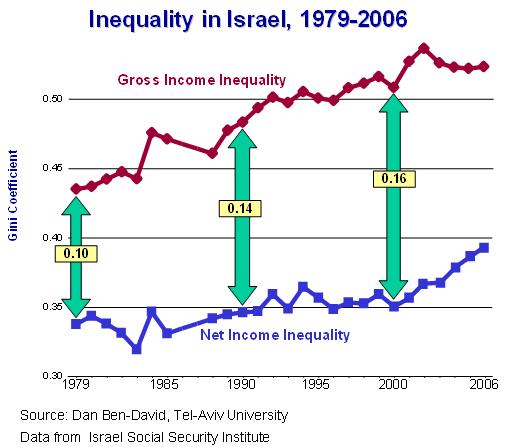|
PDF file
published
in Haaretz on January 1, 2008.
Gaps in Income and in Understanding
by Dan Ben-David The socio-economic discourse in Israel
is problematic on three main tiers of discord.
First, basic concepts are not understood by many of the debaters. For example, when comparing incomes over time,
inflation needs to be discounted. This
is done by reporting incomes in terms of constant prices which are specified
for a particular year. This is the
source of the mistake made by those who claim that the rise in incomes among
the lower income deciles between 1990 and 2006 did not surpass the price
increases. The second tier of the problematic
discourse regards the blinders resolutely worn by many of those presenting
facts to an unsuspecting public. One
side of this debate extols the virtues of economic growth without mentioning
that, in its current form, many individuals are barely able to cope. The more market failures there are – and in
Israel, there are many – the greater the number of people finding it difficult
to make ends meet, and consequently, the greater the economic gaps. The opposing side in this debate
issues reports and statements that do not contain a trace of corroboration for
President Kennedy’s adage, “a rising tide lifts all boats.” This, despite the fact that from 1967 through
2006, economic growth in Israel contributed to an increase – in constant prices
– of 275% in the poor’s living standards, as indicated by the rise in average
gross incomes in the bottom decile of families.
However, since the wealthy benefited much more from the growth, this
turned into the only aspect of the growth process publicly put forth by this
side of the debate. On the third tier of the problematic
public discourse are the plethora of superficial and radical headline-grabbing
proclamations. These prevent a broad
internalization of the big picture – one that is substantially worse than what
is brought to the fore by the usual spokespersons from the various sides. For over two and a half decades, behind the
scenes and outside the radar screens of the politicians and advocacy research
centers, gross income inequality soared upwards along a trajectory as straight
as a ruler. This steady increase, of 20%
in the Gini index between 1979 and 2006, transformed Israel into one of the
least equal countries in the Western world.
It is important to note that gross income inequality reflects the actual
level of income disparity, the level that would exist had it not been for the
existence of the social safety net of taxes and welfare. A country that does nothing to prevent
this actual increase in inequality must then implement rear-guard tax and
welfare policies in order to reduce net income gaps. This is what Israel did. During the years 1979-2000, net income
inequality – which is what the public debate focuses on – rose by “only” 4%. As a result, welfare payments had to
rise steadily and steeply – not to reduce inequality, but to prevent the
continuously-rising gross income gaps from being reflected in net income gaps. In 1980, defense spending was roughly similar
to the combined expenditures on education, health and welfare. Since then, the former has fallen and the
latter have risen. Today, the amount
that Israel spends just on welfare is greater than its entire defense
expenditure. It is a trajectory that
will have an unhappy ending if not stopped in time. This decade, we received a glimpse of what
the future holds. The defense situation
and the recession prevented continued increases in welfare spending, and this
led to a substantial increase in net income inequality. Despite the relentless barrage of
strident public statements that would have us believe otherwise, the twin
objectives of heightened growth and lower income inequality do not conflict
with one another. Treating the root
sources of these problems requires – but is not limited to – comprehensive
structural reforms in the realms of education and employment to increase the
number of people who will be able to help themselves and to contribute to their
country. But the State of Israel – its
elected officials and unelected advocacy research centers – continue to focus
on cosmetic and artificial solutions as substitutes for the real thing. When the dependent segment of the
population is growing larger by the day, it is important to understand that
there exists a point of no return. Laws
that are difficult to pass today in the Knesset will be impossible to pass in
another generation. comments
to:
danib@post.tau.ac.il
|
